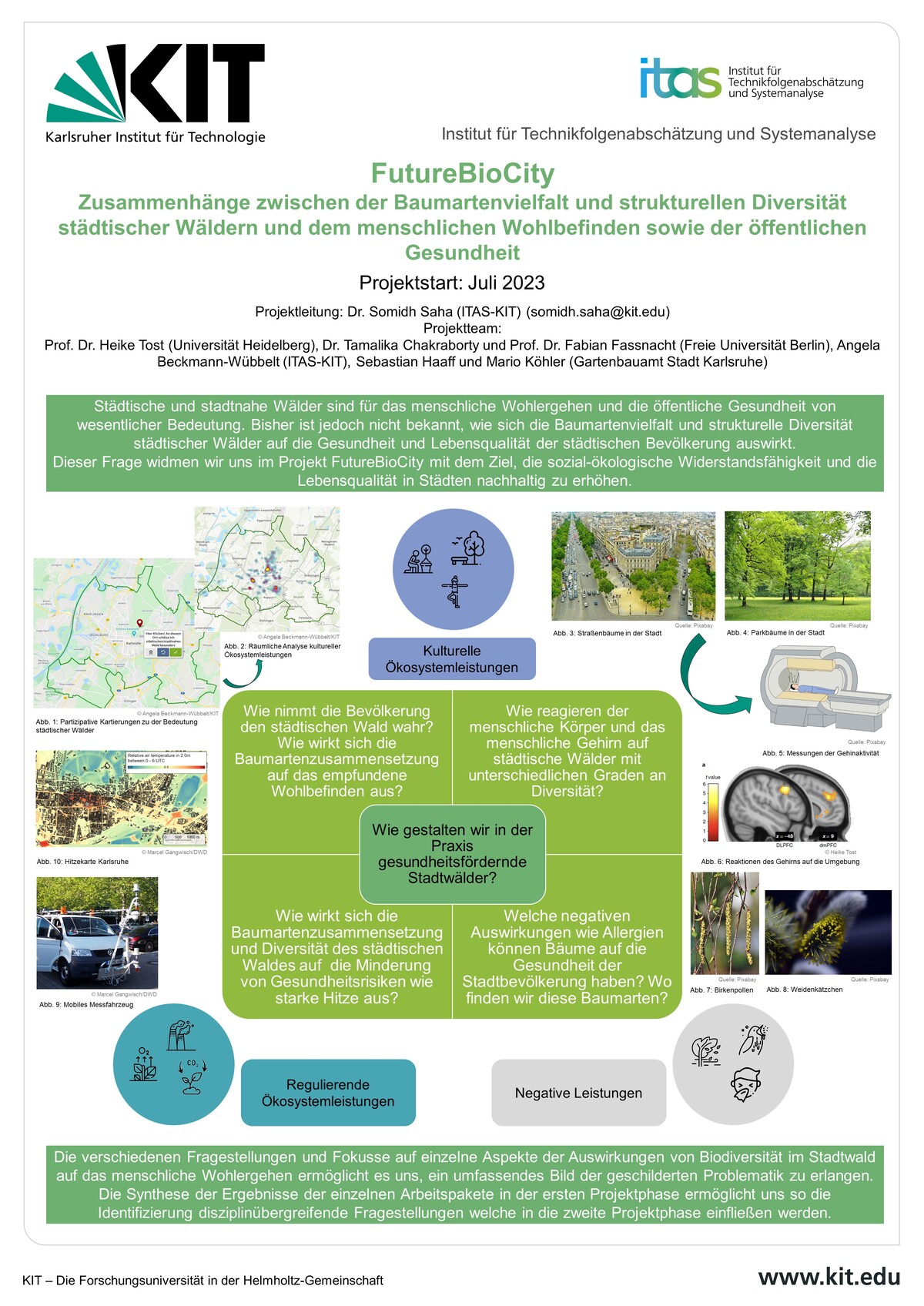FutureBioCity - Linking urban and peri-urban forest structural and tree compositional diversity to human well-being and public health
- Project team:
Saha, Somidh (Project leader); Angela Beckmann-Wübbelt
- Funding:
Federal Ministry of Education and Research
- Start date:
2023
- End date:
2024
- Project partners:
Central Institute of Mental Health (CIMH) Mannheim, Freie Universität Berlin, City of Karlsruhe (horticultural department)
- Research group:
Project description
Noise pollution, urban heat, gray concrete, stress. Just a few meters away: peace, fresh air, green leaves, rest. This comparison shows that urban and peri-urban forests are of great importance to our well-being and health. Especially during the COVID-19 pandemic, we realized the important role of urban forests and parks as critical infrastructure for our physical and mental health and stress reduction. They were places to meet, to exercise and relax, to get away from it all. However, climate change, diseases, and increasing urbanization are threatening these urban forests. Enhancing the tree species diversity and urban green space biodiversity could be a way to adapt to climate change and extreme weather events. But how does this transformation affect our well-being, public health, and how we deal with urban forests? How does our brain react to urban forests with different levels of diversity? What impact do tree species composition and biodiversity in the city have on its capacity to mitigate heat? And what negative effects, such as an increased allergy risk, could be associated with a redesign of urban forests? These are the questions we are addressing in the inter- and transdisciplinary project FutureBioCity, coordinated by the Sylvanus research group of the Institute for Technology Assessment and Systems Analysis (ITAS) at KIT, together with Freie Universität Berlin, the Central Institute of Mental Health (CIMH) Mannheim, and the City of Karlsruhe as practice partner.
The new project aims to critically assess our general working hypothesis: more tree species diversity can improve public health and human well-being in cities. A preliminary study in four interdisciplinary work packages on the effects of urban forest biodiversity on human well-being allows us to obtain a comprehensive picture of the problem described. The synthesis of the results enables us to identify cross-disciplinary research questions that will contribute to further research projects.
The Sylvanus research group at ITAS aims to investigate
- how city dwellers perceive and use urban forests in terms of cultural ecosystem services;
- what city dwellers and stakeholders think about the impact of ecological diversity on public health;
- how the diversity of urban forests affects air and surface temperature in cities.
A map-based survey and qualitative interviews will assess the impact of the composition and structure of existing urban forests in the provision of cultural ecosystem services. We will examine how the transformation of existing urban forest into more species-rich and structurally diverse ones would affect the provision of cultural ecosystem services and the public’s perception. The aim is to address different opinions of the public and various stakeholder groups on increasing biodiversity in urban forests and its impact on public health.
In order to determine the impact of street tree cover, tree diversity, and tree size on surface and air temperature, we will use existing data from 2019 and 2020 on surface and air temperature in the city of Karlsruhe. This data will be integrated with digital twin models of street trees from Greehill. This will allow us to determine the influence of forest structure and composition along the measurement routes on air and surface temperature.
Contact
Karlsruhe Institute of Technology (KIT)
Institute for Technology Assessment and Systems Analysis (ITAS)
P.O. Box 3640
76021 Karlsruhe
Germany
Tel.: +49 721 608-24644
E-mail


